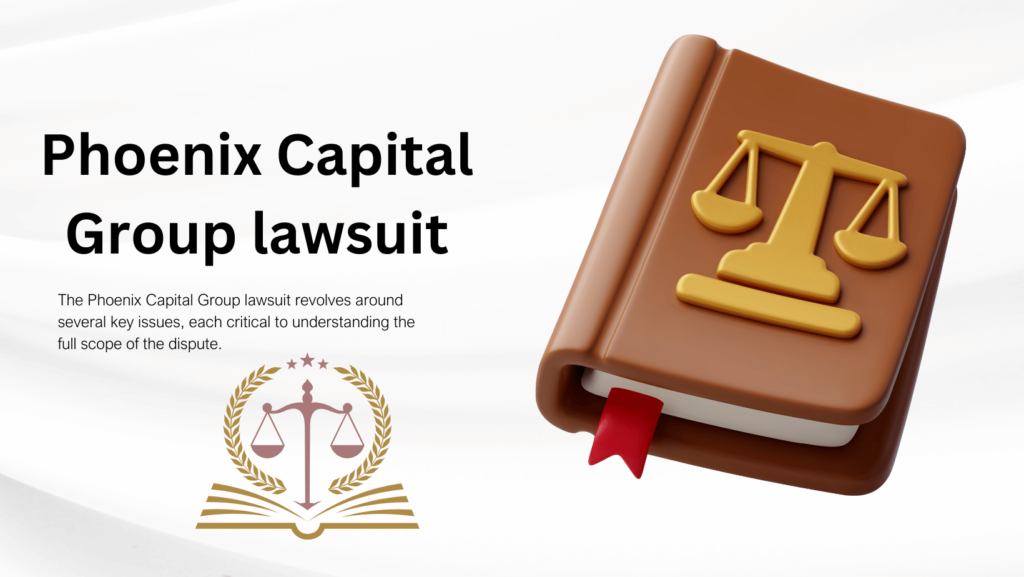An In-Depth Analysis of the Phoenix Capital Group Lawsuit

The Phoenix Capital Group lawsuit has garnered significant attention due to its high stakes and implications for the financial sector and the broader business community. This article comprehensively analyzes the lawsuit, detailing its background, the involved parties, and the potential outcomes. By examining the case from multiple perspectives, we aim to offer a thorough understanding of its significance.
Overview of Phoenix Capital Group
Phoenix Capital Group is a well-known financial industry specializing in investment management and financial advisory services. The company has built a reputation for its strategic investment approaches and robust portfolio management, attracting a diverse clientele from individual investors to large institutions. However, recent legal troubles have cast a shadow over its operations.
Brief Summary of the Lawsuit
The lawsuit against Phoenix Capital Group involves allegations of financial misconduct, including fraud and misrepresentation. Plaintiffs, primarily investors and stakeholders, claim the company engaged in deceptive practices that led to significant economic losses. The case has escalated rapidly, with both sides preparing for a protracted legal battle.
Importance and Implications of the Case
This lawsuit is not just about the financial implications for Phoenix Capital Group; it also holds broader significance for the financial industry. The outcome could set precedents for regulatory practices and corporate governance, potentially leading to stricter oversight and more stringent compliance requirements for investment firms.
Background of Phoenix Capital Group
History and Founding
Phoenix Capital Group was founded in the early 2000s by experienced financial professionals. The company quickly established itself as a formidable player in the investment management sector, leveraging innovative strategies and a client-centric approach to grow its assets under management.
Business Model and Operations
Phoenix Capital Group offers various financial services, including asset management, investment advisory, and wealth planning. Its business model focuses on creating tailored investment solutions that meet its client’s needs and goals. The firm prides itself on rigorous research and due diligence processes designed to identify lucrative investment opportunities while managing risk effectively.
Key Figures and Leadership
The leadership team at Phoenix Capital Group comprises seasoned industry veterans with extensive experience in finance and investment. Key figures include the CEO, CFO, and several senior portfolio managers, all of whom have played pivotal roles in shaping the company’s strategic direction and operational excellence.
Details of the Lawsuit
Parties Involved
The lawsuit features multiple parties on both sides. The plaintiffs include a group of investors and former clients who allege that Phoenix Capital Group’s practices misled them. On the defense side, Phoenix Capital Group and several top executives are named in the suit, each facing various misconduct charges.
Timeline of Events Leading Up to the Lawsuit
The lawsuit’s origins can be traced back to financial discrepancies and investor complaints that surfaced over the past few years. Initial concerns were raised about the accuracy of Phoenix Capital Group’s financial reporting and the transparency of its investment practices. As these issues persisted, formal complaints were lodged, culminating in legal action.
Specific Allegations and Claims
The core allegations against Phoenix Capital Group include fraud, breach of fiduciary duty, and misrepresentation. Plaintiffs assert that the company provided misleading information about the performance and risks associated with certain investments, leading to significant financial losses. They also claim that Phoenix Capital Group failed to act in the best interests of its clients, prioritizing its profits instead.
Legal Grounds for the Lawsuit
The lawsuit is grounded in several legal principles, including securities fraud and breach of fiduciary duty. Plaintiffs argue that Phoenix Capital Group violated federal securities laws by making false statements and omissions that influenced their investment decisions. Additionally, they claim that the company’s actions breached its fiduciary duty to act in the best interests of its clients.
Plaintiff’s Perspective
Who Are the Plaintiffs?
The plaintiffs are primarily individual investors and former clients of Phoenix Capital Group who alleged they suffered substantial financial losses due to the company’s misconduct. These individuals have come together to file a class-action lawsuit, seeking compensation for their losses and punitive damages.
Main Grievances and Demands
The plaintiffs’ main grievances revolve around the alleged misrepresentation of investment opportunities and the lack of transparency in financial reporting. They demand compensation for their economic losses and punitive damages to deter similar conduct in the future. Additionally, they seek greater regulatory oversight of Phoenix Capital Group’s operations.
Evidence Presented by the Plaintiffs
The plaintiffs have presented various evidence to support their claims, including financial records, internal communications, and expert testimony. They argue that this evidence demonstrates a pattern of deceptive practices and a willful disregard for clients’ interests. Key evidence includes emails and documents allegedly showing intentional misrepresentation by Phoenix Capital Group executives.
Legal Arguments and Strategies
The plaintiffs’ legal strategy focuses on proving that Phoenix Capital Group engaged in a systematic pattern of fraud and misrepresentation. They aim to demonstrate that the company knowingly provided false information to investors, resulting in significant financial harm. Their arguments are bolstered by expert testimony and detailed financial analyses highlighting discrepancies in Phoenix Capital Group’s reporting.
Read More
Defendant’s Perspective
Response from Phoenix Capital Group
Phoenix Capital Group has vigorously denied the allegations, asserting they have always acted by legal and ethical standards. The company argues that the plaintiffs’ claims are unfounded and that any losses incurred were due to market conditions and other external factors beyond their control.
Key Defenses and Counterarguments
The defense has presented several vital arguments, including the assertion that all investments carry inherent risks and that the plaintiffs were aware of these risks. They also argue that Phoenix Capital Group provided all necessary disclosures and that any discrepancies in financial reporting were unintentional and promptly corrected. Additionally, the defense contends that the plaintiffs have not provided sufficient evidence to prove their claims.
Evidence and Testimonies Provided by the Defense
Phoenix Capital Group has submitted extensive documentation to support its defense, including financial reports, client communications, and expert testimony. They argue that this evidence demonstrates their commitment to transparency and ethical conduct. Key testimonies from industry experts and company executives aim to refute the plaintiffs’ allegations and provide context for the decisions and actions in question.
Legal Strategies and Representation
The defense strategy focuses on discrediting the plaintiffs’ evidence and demonstrating that Phoenix Capital Group acted in good faith. They aim to show that any discrepancies were minor and did not constitute fraud or intentional misconduct. The defense is represented by a team of experienced attorneys specializing in securities law and corporate litigation.
Legal Proceedings
Critical Hearings and Court Dates
The lawsuit has seen several vital hearings, with both sides presenting their initial arguments and evidence. The court has scheduled additional hearings and trial dates to allow for a thorough examination of the case. These proceedings are expected to span several months, given the complexity and scope of the allegations.
Significant Rulings and Interim Decisions
The court has issued several interim decisions, including rulings on motions to dismiss and requests for additional evidence. These rulings have set the stage for the main trial, shaping the legal landscape and influencing both parties’ strategies. Critical decisions have included the court’s refusal to dismiss the case, signaling that the plaintiffs’ claims merit a full hearing.
Role of the Judge and Jury
The judge and jury will play crucial roles in determining the lawsuit’s outcome. The judge will oversee the proceedings, ensuring both sides adhere to legal standards and procedures. Based on the evidence and arguments presented, the jury will ultimately decide whether Phoenix Capital Group is liable for the alleged misconduct.
Expert Testimonies and Witness Statements
Both sides have called upon expert witnesses to provide testimony on various aspects of the case. These experts include financial analysts, industry professionals, and legal scholars who can offer insights into the complexities of the allegations. Their testimonies will be critical in helping the jury understand the technical details and implications of the evidence.
Impact on Phoenix Capital Group
Financial Implications
The lawsuit has significant financial implications for Phoenix Capital Group. The potential for substantial damages, legal fees, and the cost of ongoing litigation poses a severe threat to the company’s financial stability. Additionally, the negative publicity surrounding the case has already impacted investor confidence and client relationships.
Effect on Business Operations and Reputation
Beyond the immediate financial impact, the lawsuit has affected Phoenix Capital Group’s day-to-day operations and overall reputation. The company has had to allocate substantial resources to its legal defense, diverting attention from its core business activities. The allegations have also damaged its reputation, potentially leading to losing clients and decreased market trust.
Responses and Statements from the Company’s Leadership
Phoenix Capital Group’s leadership has proactively addressed the allegations, issuing statements reaffirming their commitment to ethical conduct and transparency. They have emphasized that the lawsuit is based on unfounded claims and expressed confidence in a favorable outcome. These statements aim to reassure clients, investors, and the broader market of the company’s integrity and resilience.
Shareholder and Investor Reactions
Shareholders and investors have closely monitored the lawsuit, with many expressing concern about its potential impact on their investments. The company’s stock price has experienced volatility as the case progresses, reflecting the uncertainty and risk associated with the legal proceedings. Some investors have called for greater oversight and changes in leadership to restore confidence and stability.
Wider Industry Implications
Impact on the Finance and Investment Industry
The Phoenix Capital Group lawsuit has broader implications for the finance and investment industry, highlighting the importance of transparency and ethical conduct. The case has prompted regulators to scrutinize similar companies more closely, potentially leading to increased regulatory oversight and stricter compliance requirements.
Regulatory Scrutiny and Potential Changes
In response to the allegations, regulatory bodies will likely implement new measures to enhance transparency and protect investors. These changes could include stricter reporting standards, enhanced due diligence requirements, and more rigorous enforcement of existing regulations. The lawsuit’s outcome could catalyze these reforms, setting new precedents for the industry.
Reactions from Competitors and Market Analysts
Competitors and market analysts have been closely watching the lawsuit, with many predicting that its outcome will ripple across the industry. Some competitors may capitalize on Phoenix Capital Group’s troubles by courting its clients and highlighting their ethical practices. Market analysts also assess the potential long-term impacts on investor confidence and market dynamics.
Read More
Public and Media Reactions
Coverage of the Lawsuit in the Media
The lawsuit has received extensive coverage in the media, with numerous articles and reports detailing the allegations and legal proceedings. Media outlets have highlighted the case’s significance, offering analysis and commentary on its potential implications for the financial industry. This coverage has contributed to the public’s awareness and understanding of the issues at stake.
Public Opinion and Social Media Discourse
Public opinion on the lawsuit has been divided, with some viewing it as a necessary step toward accountability and others questioning the plaintiffs’ motives. Social media platforms have seen lively discussions and debates, with users sharing their perspectives and opinions on the case. These discussions reflect broader concerns about corporate ethics and the responsibility of financial institutions.
Statements from Industry Experts and Commentators
Industry experts and commentators have weighed in on the lawsuit, offering diverse viewpoints on its potential outcomes and implications. Some experts argue that the case could lead to meaningful reforms and greater accountability in the financial sector. In contrast, others caution that it could also increase regulatory burdens and operational challenges for investment firms.
Potential Outcomes and Consequences
Possible Verdicts and Their Implications
The lawsuit could result in several possible verdicts, each with its implications. A ruling favoring the plaintiffs could lead to substantial financial penalties for Phoenix Capital Group and potentially set a precedent for similar cases. Conversely, a verdict favoring the defense could reinforce the company’s position and mitigate some negative impacts.
Settlement Options and Negotiations
Settlement negotiations are another possible outcome, with both sides potentially reaching an agreement to avoid a prolonged trial. A settlement could involve financial compensation for the plaintiffs and changes in Phoenix Capital Group’s practices to address the allegations. Such an outcome could provide a more practical resolution while mitigating some of the financial and reputational damage.
Long-Term Consequences for Phoenix Capital Group and the Plaintiffs
Regardless of the verdict, the lawsuit will likely have long-term consequences for Phoenix Capital Group and the plaintiffs. The company may need to change its operations and governance significantly to restore trust and comply with regulatory requirements. The plaintiffs, meanwhile, may achieve some measure of justice and compensation, but the legal battle could also have lasting personal and financial impacts.
Read More
Conclusion
Summary of Key Points
The Phoenix Capital Group lawsuit is a complex and high-stakes case with significant implications for the financial industry. The allegations of fraud and misrepresentation have prompted a thorough examination of the company’s practices and led to a protracted legal battle.
The Current Status of the Lawsuit
As of now, the lawsuit is ongoing, with both sides preparing for the main trial. The court has made several critical interim decisions, and the outcome remains uncertain. The case continues to attract widespread attention and scrutiny from investors, regulators, and the public.
Final Thoughts on the Broader Significance of the Case
The Phoenix Capital Group lawsuit underscores the importance of transparency, ethical conduct, and regulatory oversight in the financial industry. Regardless of the final verdict, the case will likely influence future regulatory practices and corporate governance standards, shaping the landscape for investment firms and their clients for years to come.






